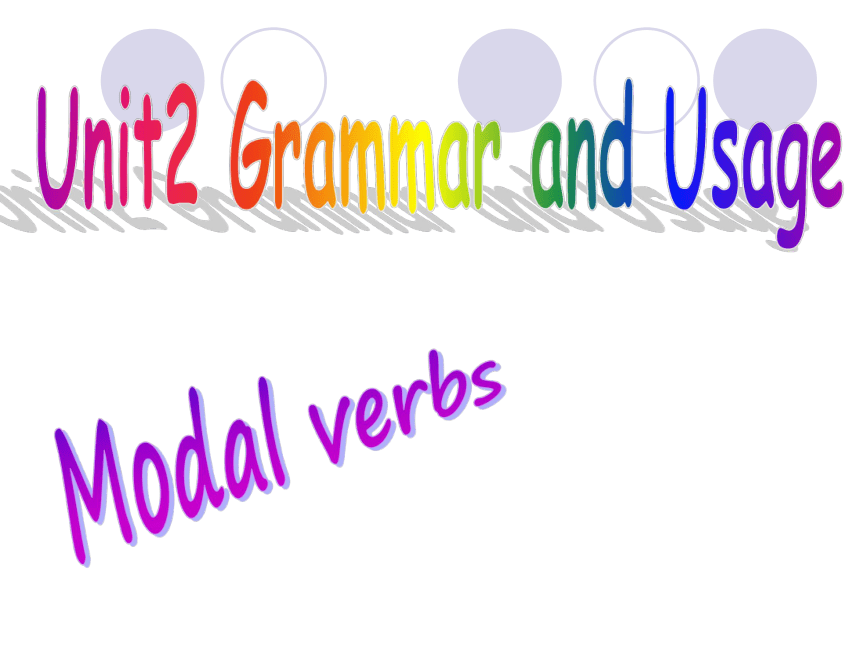
课件61张PPT。Unit2 Grammar and UsageModal verbsstudying aims1.Learn the usuages 0f modal verbs. 2.Learn to use modal verbs with exercises. What’s the definition of modal verbs?情态动词是一种本身有一定的词义,表示说话人的情绪,态度或语气的动词,但不能单独作谓语, 只能和其他动词原形构成谓语。 一.情态动词的语法特征1)?情态动词?不能单独做谓语,除ought ?和have?外,后面只能接不带to?的不定式。 2)?情态动词没有人称,数的变化,但有些情态动词,如can、will也有一般式和过去式的变化。3)?情态动词的“时态”形式并不是时间区别的主要标志,不少情况下,情态动词的现在式形式和过去式形式都可用来表示现在时间、过去时间和将来时间。(1). We use modal verbs to talk about:1. Ability (能力) 2. Obligation (义务) 3. Certainty (可能性) 4. Permission (允许)二.情态动词的语法功能(2).We also use modal verbs to:5. Make requests(提出请求) 6. Make suggestions(提出建议) 7. Make offers(提供帮助) 8. Give advice(提出意见) 情态动词1. can could be able to4. shall 2. may might三.常见情态动词的基本用法5. must have to 3. will would7. need dare6. ought to should8. 情态动词+have done 情态动词1. can could be able to3. shall 2. may mightThe usage of some common modal verbs4. must have to 5. 情态动词+have done1.can� 1)表能力� can表能力时意味着凭体力或脑力或技术等可以无甚阻力地去做某事。� I can climb this pole. He is only four , but he can read. Fire can’t destroy gold. ①can 和could:2)表推测、可能性(用于否定与疑问结构中) Can the news be true? It can’t be true. What can he possibly mean? 他可能是什么意思? 3)表示请求或允许(和may意思相近)常见于口语。 Can (May) I come in ? 我能进来吗? Can I smoke here ? 我可以在这里抽烟吗?�2) could的主要用法是: A. could 是can的过去式, 表示与过去 有关的能力和推测: eg. We all knew that the young man couldn’t be a doctor. B. could可以代替can表示请求、允许。可表示委婉客气的提出问题或陈述看法Could you lend me your dictionary? Could I use your bike? Yes, you can. I’m afraid I couldn’t give you an answer today.� �Attention:can/be able to区别:can表示与生俱来的能力或一种客观可能,而be able to更加强调通过后天的学习和努力获得的能力,或者在某个客观的场合和背景下,能做到的事情。I can’t swim, but I am sure I will be able to swim through more practicing.表示特定的某一过去能力或表示成功地做了某事时,只能用was/were?able?to,?不能用could。 He?_____?flee?Europe?before?the?war?broke?out. ?? Note:was able toA big fire broke out in ABC hotel yesterday. Luckily, everyone _____ run out of the building.was able to2. She _____ speak both English and French.canI can’t thank you too much.can never/can’t……too表示“无论怎样…也不过分”,“越…越好” 。你过马路的时候再小心也不为过。 You can’t be too careful while crossing the road. She couldn’t but agree to my idea. I can’t thank you enough. The film couldn’t be any worse.Can或could 的否定形式构成习惯短语 Can’t...too... Can’t ....enough...无论怎样……也不过分…… Can’t (help) but do不得不做,只好做 Can’t help doing 情不自禁 Can’t help it 没有办法 Can’t ...+比较级 再……不过了(表示最高级)May ... ...
~~ 您好,已阅读到文档的结尾了 ~~